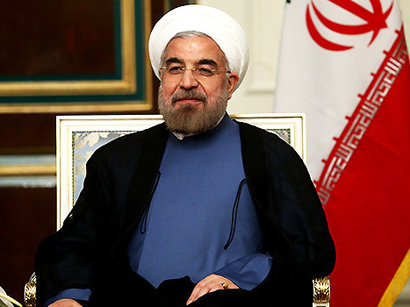Baku, Azerbaijan, Feb. 26
By Umid Niayesh, Saeed Isayev - Trend:
The prices for energy carriers will increase slowly in the next Iranian calendar year (ends in March), Iran's president Hassan Rouhani said, state-run IRINN TV reported on Feb. 26.
Rouhani made the remarks while addressing the people of Jask city in Iran's southern province of Hormozgan.
The Parliament approved the generalities of changes to the next year's budget bill on Jan.28. One of the most controversial items of the budget was the subsidy reform plan.
The budget bill didn't specify detailed fuels prices, but increasing the government's incomes from the subsidy reform plan means more cuts to the state finances on subsided commodities and the necessity of raising fuel prices.
President Rouhani's administration has set the goal of 519 trillion rials, (about $20.9 billion) government's income from implementation of the subsidy reform plan in budget bill. The government's income from the subsidy reform plan is expected to be around $11.26 billion in the current year.
Fars News Agency quoted the Member of Parliament Ahmad Tavakoli on Jan.28 as saying that in order to achieve the set goal of $20.9 billion, the government needs to double fuel prices, which will not be affordable to citizens.
The subsidy reform plan is aimed at easing pressure on state finances by cutting tens of billions of dollars from government subsidies on food and fuel. The government pays cash to citizens as compensation for increased prices by cutting subsides.
The subsidy reform plan pays 455,000 rials (about $18 based on the U.S. dollar official exchange rate of 24,800 rials) to Iranians, eliminating subsidies for fuels and some commodities.
Commenting on the second phase of the subsidy reform plan, Rouhani said that the administration will pay attention to providing food security for the people. He added that food package subsidies will be delivered to people, along with the cash subsidies.
The administration will pay more attention to the issue, Rouhani underlined.
On Feb. 2, the government began distributing food packages to help low-income Iranians. But bad planning caused it to go wrong, and the administration was seriously criticized on the issue.
Rouhani said that in last six months the inflation rate in Iran has decreased, forecasting that the figure will stand at 35 percent by the end of current Iranian calendar year.
"The decreasing trend of the inflation rate will continue in the next year and will reach 25 percent," he said, expressing hope that Iran's economy will experience growth by next year.
The rate of economic growth is at minus 2 percent for the first half of the current Iranian calendar year (started on March 21, 2013), vice-president for Strategic Planning and Control, Mohammad Baqer Nobakht said on Feb. 24.
According to official reports, in the last Iranian calendar year, the country experienced negative 5.8 percent economic growth.
Rouhani also said that the administration will pay attention to health and treatment issues of the citizens. He noted that as part of the first step, all people in the country will be covered by health insurance.
Commenting on the relations with southern Gulf neighbors, the president said that his administration's foreign policy is based on cooperation and friendship with all neighbors, in particular those in the southern part of the Gulf.
"We want to cooperate with them for a secure and safe region," he underlined.
Rouhani also invited all Iranian and foreign investor to invest in Jask, saying that the Jask port will develop as an important marine and economic hub in the future.
|
Details of gasoline price rise in Iran after implementing subsidy reform plan(Dec. 2010) |
||
|
Fuel |
Price before implementing the plan/one liter |
Current price / one liter |
|
Ordinary semi-subsidized gasoline |
1000 rials |
4000 rials |
|
premium semi-subsidized gasoline |
1500 rials |
5000 rials |
|
Ordinary gasoline |
1000 rials |
7000 rials |
|
Premium gasoline |
5000 rials |
8000 rials |
Currently the official rate of the U.S. dollar against the Iranian rial stands at 24,893 rials/USD, while the free market rate is 30,200 rials/USD.






